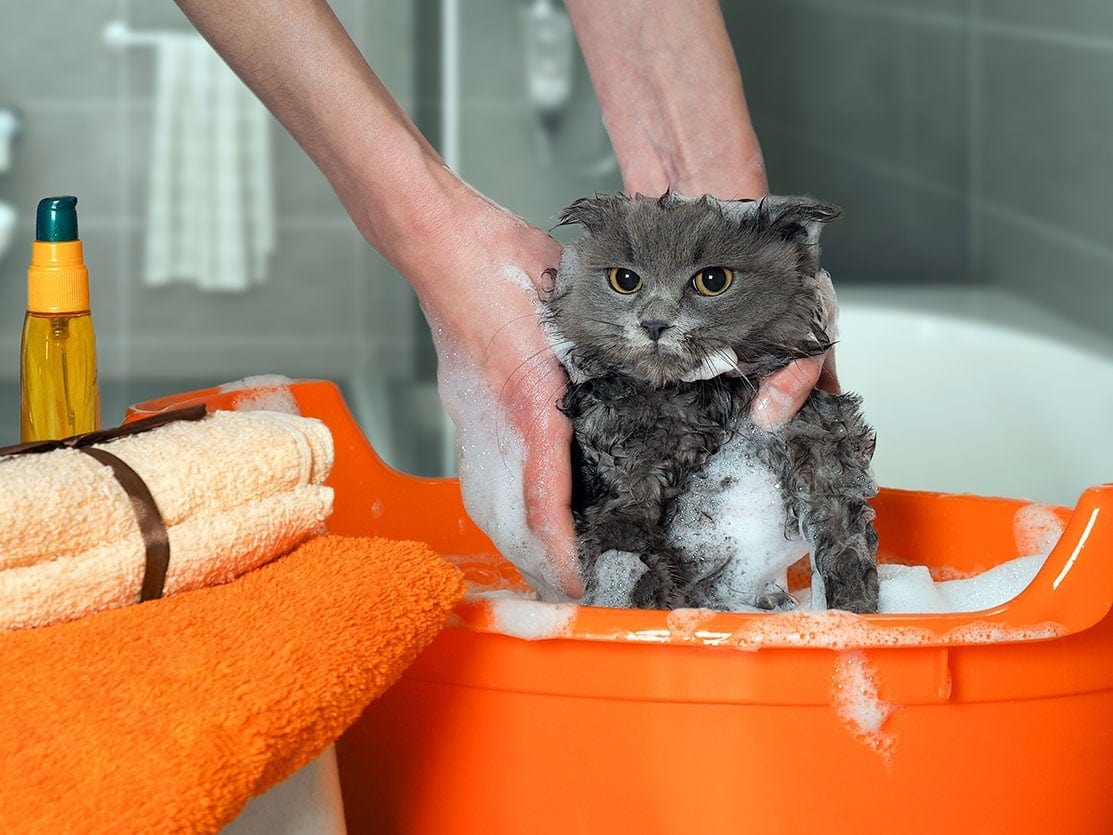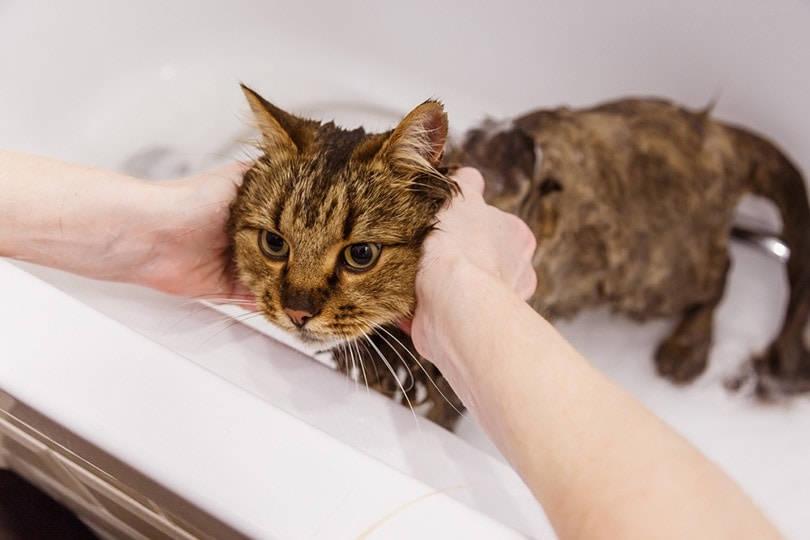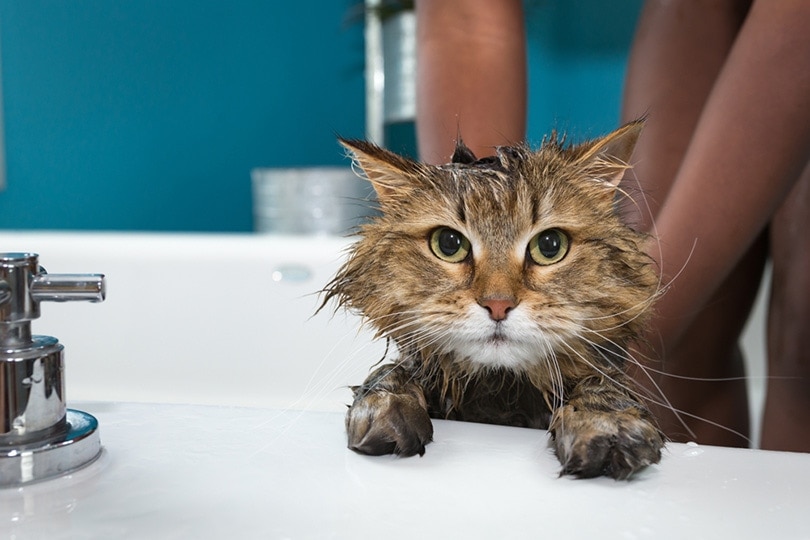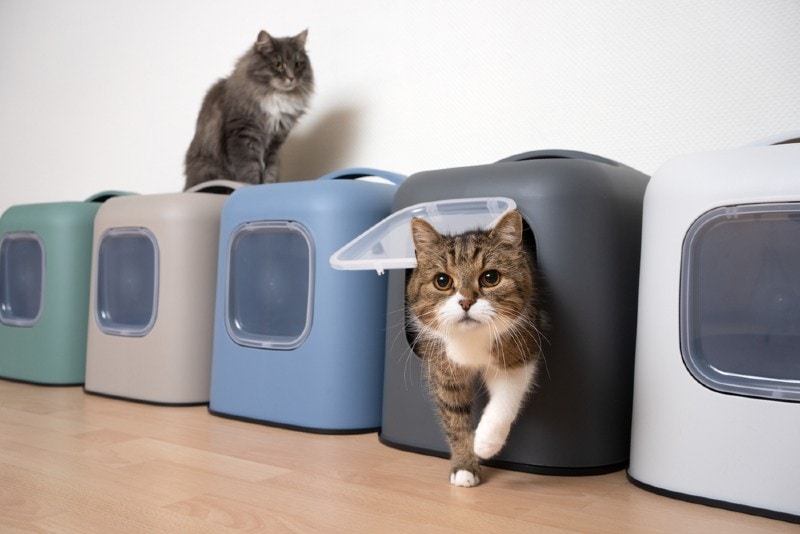5 Homemade Cat Shampoo Ideas You Can Try Today (Vet-Approved)

Updated on

Cats don’t usually love water, but sometimes they need a bath, and that leaves you reaching for the shampoo. Do you only have human shampoo in the house? Does your kitty need a bath right away, and you don’t have time to run to the store? Or do you just want to save a little money? All of these can be good reasons to try a DIY cat shampoo solution, instead of going for store-bought shampoo. These shampoos should only be used occasionally and not on cats with any kind of skin problem. If your cat needs regular bathing or has skin conditions contact your veterinary clinic for advice.
Here are five ideas for cat shampoos made from everyday household items. One of them will be a great fit for your needs! Be sure to keep your cat out of the ingredients and make sure they don’t try to groom off the shampoos.
The 5 Homemade Cat Shampoo Ideas
1. Basic Cat Shampoo
Basic Homemade Cat Shampoo
Equipment
- Bowl or bucket
- Spoon
Materials
- 1 part apple cider vinegar
- 1 part Dawn dish soap
- 4 parts water
Instructions
- Mix one-part each of apple cider vinegar and dawn dish soap together with four parts water.
- You can use this shampoo like regular pet shampoo—wet your cat’s fur first, and then add the cat shampoo.
- Rub the shampoo through all layers of your cat’s fur, then rinse well with warm water.
- Be sure to keep the soap out of your cat's eyes, ears, nose and mouth.
Notes
2. Smelly Odor Shampoo Rinse
If you need to get rid of smells but not break down oils, you can try a different method. Mix one to two tablespoons of baking soda with a quarter cup of warm water, then rub it into your cat’s fur. Let it sit for at least 2 minutes (5 minutes is better if your cat’s odor is really strong), and then rinse it out with warm water. The baking soda will neutralize odors without being hard on your kitty’s skin.
3. Gentle Shampoo for Sensitive Skin
Sensitive skin can make even the gentlest store-bought shampoos irritating. This solution is great for sensitive skin. Make sure to use organic products for best results—that way, you can be sure there are no irritating pesticides.
Use a blender or food processor to blend ½ cup of oatmeal to a powder. Add ½ cup of baking soda, 1 tbsp of Dawn dish soap, and 2 cups of warm water to the oatmeal. Mix thoroughly and apply to your pet’s fur. Allow it to soak for just a minute before rinsing. The dish soap and baking soda will help clean your cat’s fur and skin, while the oatmeal moisturizes and hydrates skin and softens fur. This makes the shampoo better for sensitive skin.

4. Dry Cat Shampoo
If bath time is always a battle, consider using dry shampoo instead. You can make an effective dry shampoo by mixing equal parts ground oatmeal and cornmeal. Put the mixture in a 275°F oven for five minutes. After you remove it from the oven and while the mixture is slightly warm but not hot, sprinkle the mixture into your cat’s fur. Let it sit for five minutes, then brush your cat’s fur out until the mixture is fully removed. This is best done outdoors because dry shampoo tends to be messy.
Keeping your pet clean doesn't have to be hard! Our Hepper No Rinse Shampoo gently cleans as it moisturizes and doesn't require any water. The formula is pH-balanced and free of dyes, soaps, gluten, DEA, and phthalates. Plus, you and your cat will love the long-lasting cucumber and aloe scent.
5. Coconut Oil Shampoo
Another alternative to traditional cat shampoos is coconut oil. Coconut oil is safe for cats and can be used to clean and moisturize your cat’s fur and skin. Rub a small amount of coconut oil into your cat’s fur, brushing it out as you go to remove dirt and shed fur.

Cat Grooming Habits
Cats are usually very clean creatures—they spend hours grooming their fur every day, removing dirt, and brushing it smoothly. Most of the time, regular baths are not necessary. But some cats are not up to the task of grooming on their own. Many long-haired cats struggle to keep dirt and mats out of their fur and need regular brushing and bathing to help them manage it.
Older cats or cats recovering from an injury might not have the mobility to clean themselves thoroughly. Finally, sometimes cats might get dirty in a way that leaves you wanting to clean them fully instead of letting them lick themselves clean. Cat baths can be a good alternative if your cat can’t clean itself.
Last Thoughts
Not all shampoos are the same and picking the right shampoo to match your needs can be tricky. These five shampoo options are all great ways to keep your cat clean and healthy without using store-bought pet formulas. If your cat is in a sticky situation, we hope these shampoos can help you clean up and keep your cat healthy and happy in the process!
Featured Image Credit By: Irina Kozorog, Shutterstock















